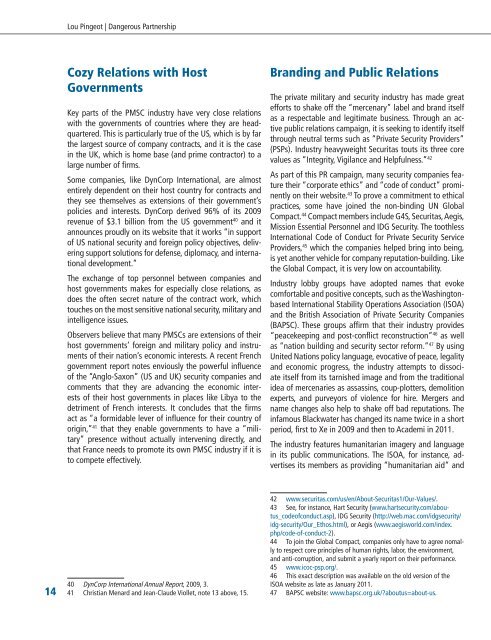Dangerous Partnership - Global Policy Forum
Dangerous Partnership - Global Policy Forum
Dangerous Partnership - Global Policy Forum
Create successful ePaper yourself
Turn your PDF publications into a flip-book with our unique Google optimized e-Paper software.
Lou Pingeot | <strong>Dangerous</strong> <strong>Partnership</strong><br />
Cozy Relations with Host<br />
Governments<br />
Key parts of the PMSC industry have very close relations<br />
with the governments of countries where they are headquartered.<br />
This is particularly true of the US, which is by far<br />
the largest source of company contracts, and it is the case<br />
in the UK, which is home base (and prime contractor) to a<br />
large number of firms.<br />
Some companies, like DynCorp International, are almost<br />
entirely dependent on their host country for contracts and<br />
they see themselves as extensions of their government’s<br />
policies and interests. DynCorp derived 96% of its 2009<br />
revenue of $3.1 billion from the US government 40 and it<br />
announces proudly on its website that it works “in support<br />
of US national security and foreign policy objectives, delivering<br />
support solutions for defense, diplomacy, and international<br />
development.”<br />
The exchange of top personnel between companies and<br />
host governments makes for especially close relations, as<br />
does the often secret nature of the contract work, which<br />
touches on the most sensitive national security, military and<br />
intelligence issues.<br />
Observers believe that many PMSCs are extensions of their<br />
host governments’ foreign and military policy and instruments<br />
of their nation’s economic interests. A recent French<br />
government report notes enviously the powerful influence<br />
of the “Anglo-Saxon” (US and UK) security companies and<br />
comments that they are advancing the economic interests<br />
of their host governments in places like Libya to the<br />
detriment of French interests. It concludes that the firms<br />
act as “a formidable lever of influence for their country of<br />
origin,” 41 that they enable governments to have a “military”<br />
presence without actually intervening directly, and<br />
that France needs to promote its own PMSC industry if it is<br />
to compete effectively.<br />
Branding and Public Relations<br />
The private military and security industry has made great<br />
efforts to shake off the “mercenary” label and brand itself<br />
as a respectable and legitimate business. Through an active<br />
public relations campaign, it is seeking to identify itself<br />
through neutral terms such as “Private Security Providers”<br />
(PSPs). Industry heavyweight Securitas touts its three core<br />
values as “Integrity, Vigilance and Helpfulness.” 42<br />
As part of this PR campaign, many security companies feature<br />
their “corporate ethics” and “code of conduct” prominently<br />
on their website. 43 To prove a commitment to ethical<br />
practices, some have joined the non-binding UN <strong>Global</strong><br />
Compact. 44 Compact members include G4S, Securitas, Aegis,<br />
Mission Essential Personnel and IDG Security. The toothless<br />
International Code of Conduct for Private Security Service<br />
Providers, 45 which the companies helped bring into being,<br />
is yet another vehicle for company reputation-building. Like<br />
the <strong>Global</strong> Compact, it is very low on accountability.<br />
Industry lobby groups have adopted names that evoke<br />
comfortable and positive concepts, such as the Washingtonbased<br />
International Stability Operations Association (ISOA)<br />
and the British Association of Private Security Companies<br />
(BAPSC). These groups affirm that their industry provides<br />
“peacekeeping and post-conflict reconstruction” 46 as well<br />
as “nation building and security sector reform.” 47 By using<br />
United Nations policy language, evocative of peace, legality<br />
and economic progress, the industry attempts to dissociate<br />
itself from its tarnished image and from the traditional<br />
idea of mercenaries as assassins, coup-plotters, demolition<br />
experts, and purveyors of violence for hire. Mergers and<br />
name changes also help to shake off bad reputations. The<br />
infamous Blackwater has changed its name twice in a short<br />
period, first to Xe in 2009 and then to Academi in 2011.<br />
The industry features humanitarian imagery and language<br />
in its public communications. The ISOA, for instance, advertises<br />
its members as providing “humanitarian aid” and<br />
14<br />
40 DynCorp International Annual Report, 2009, 3.<br />
41 Christian Menard and Jean-Claude Viollet, note 13 above, 15.<br />
42 www.securitas.com/us/en/About-Securitas1/Our-Values/.<br />
43 See, for instance, Hart Security (www.hartsecurity.com/aboutus_codeofconduct.asp),<br />
IDG Security (http://web.mac.com/idgsecurity/<br />
idg-security/Our_Ethos.html), or Aegis (www.aegisworld.com/index.<br />
php/code-of-conduct-2).<br />
44 To join the <strong>Global</strong> Compact, companies only have to agree nomally<br />
to respect core principles of human rights, labor, the environment,<br />
and anti-corruption, and submit a yearly report on their performance.<br />
45 www.icoc-psp.org/.<br />
46 This exact description was available on the old version of the<br />
ISOA website as late as January 2011.<br />
47 BAPSC website: www.bapsc.org.uk/?aboutus=about-us.


